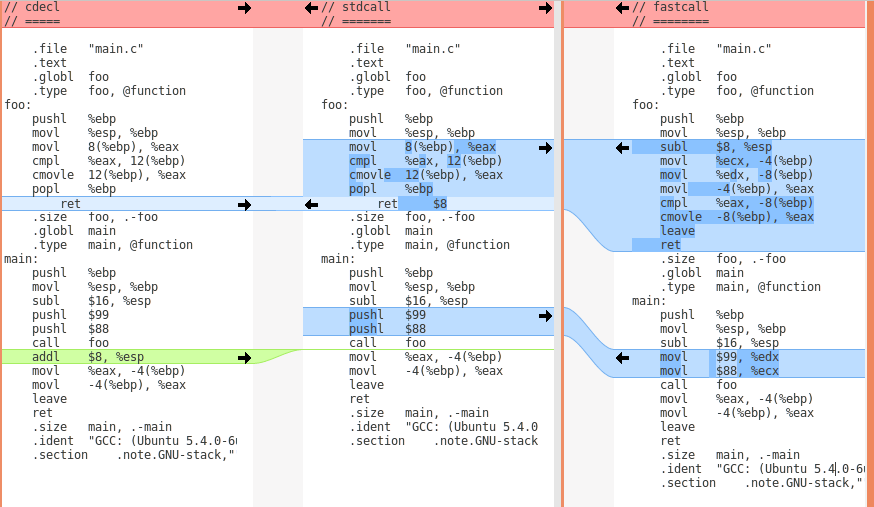When I was in the process of creating the OpenGL loader that I described in my last blog post, I forgot to add the WINAPI prefix to the function declarations. Someone pointed out to me on Twitter that the code would fail on 32-bit compilation. I checked, and it did. Addition of the WINAPI macro fixed this problem. The WINAPI macro expands to __stdcall on 32-bit compilation on Windows.
I had encountered stdcall and more of these mysterious keywords in the past, but only had a vague idea of what they did. And so I did some web research, dumped some assembly files, and studied a three-way diff. What follows is an analysis of cdecl, stdcall and fastcall, and how assembly code differs between these three calling conventions.
The experiment
I wrote a small C program:
int __attribute__((cdecl)) foo(int a, int b) {
return (a < b) ? a : b;
}
int main() {
int i = foo(88, 99);
return i;
}I compiled the program and generated the assembly using the command gcc -S -m32 main.c. I did this three times, changing the value of __attribute__ to cdecl, stdcall, and fastcall respectively. Then I diffed the results.
The diff

You can find the output text here.
Let’s have a look at the interesting parts of the generated assembly programs:
cdecl
Let’s have a look at the cdecl assembly, starting from the main: block. In the stack diagrams that follow, memory addresses decrease as you go down. Thus, in the diagrams below, stacks grow downward.
main:
pushl %ebp
movl %esp, %ebp
---------------- <-- esp, ebpThe ebp register stores the base pointer, which is the base of the stack for the given stack frame. This pointer keeps pointing to the same location for the lifetime of that stack frame. The esp register stores the stack pointer. This pointer moves as the stack grows and shrinks. These two lines of code create a new stack frame. pushl %ebp pushes the previous value of ebp on the stack, and the movl %esp, %ebp moves ebp such that both now point at the same location.
While returning from a function, you’ll do a popl %ebp or a leave to restore the value of the previous stack frame.
subl $16, %esp
---------------- <-- ebp
16 bytes
---------------- <-- espA value of 16 is subtracted from esp. Note that this is the stack growing downward, and conceptually, esp always denotes the top of the stack.
pushl $99
pushl $88
---------------- <-- ebp
16 bytes
- - - - - -
99 } 4 bytes
- - - - - -
88 } 4 bytes
---------------- <-- espThe two parameters - 88 and 99 - are pushed onto the stack. This is because the cdecl calling convention doesn’t allow the use of registers for passing parameters. 4 bytes are allocated per parameter because they are ints. The amount of stack space allocated doesn’t necessarily equate to the sizes of the parameters. Extra space may be added for alignment purposes.
call foo
(body of foo)
addl $8, %esp
---------------- <-- ebp
16 bytes
---------------- <-- esp
99
- - - - - -
88
- - - - - -Now, the function foo is called. It executes and returns. Then, we execute an addl instruction to increment esp, which shrinks the stack. This instruction cleans up the stack growth that happened when we pushed the two parameters to the stack. This is because in cdecl, the caller is responsible for the cleanup.
stdcall
The assembly for the stdcall variant is identical to the cdecl variant, except that in this variant, the callee is responsible for stack cleanup. As a result, the addl instruction in the main function used for cleanup is absent, and the ret instruction in the foo function is now ret $8.
fastcall
movl $99, %edx
movl $88, %ecxThe code here is substantially different, since fastcall allows us to pass parameters through the ecx and edx registers. The parameters are now stored in registers instead of pushing them on the stack. Note that fastcall only allows us to use these two registers. If more parameters need to be passed, they spill over into the stack.
subl $8, %esp
movl %ecx, -4(%ebp)
movl %edx, -8(%ebp)
movl -4(%ebp), %eax
cmpl %eax, -8(%ebp)
cmovle -8(%ebp), %eaxAlthough this code shows up as a substantial diff as compared to the previous variants, it is (unsurprisingly) functionally similar. It manually allocates stack space by decrementing esp. Then it moves the ecx and edx values on to the stack, based on addresses relative to ebp. Then it proceeds with the same logic the other variants.
Addresses are different here because the parameters now belong to a different stack frame, than in the previous variants.
Closing notes
To summarize, calling conventions dictate how parameters are passed to functions, and who is in charge of the cleanup. These are the results we found:
| Convention | Cleanup responsibility | Parameter-passing |
|---|---|---|
cdecl | caller | stack |
stdcall | callee | stack |
fastcall | callee | %ecx, %edx, stack |
Fortunately, in 64-bit compilation, there aren’t as many variants of calling conventions, and things seem to be a bit more sane. As a result, the specifics of the calling conventions investigated above may not be extremely valuable in a modern execution environment. However, this does give us an insight into the mechanics of parameter-passing and stack allocation and cleanup, which should be relevant even today.
If you would like to study this in more detail, Agner Fog has written a really good document on the topic.